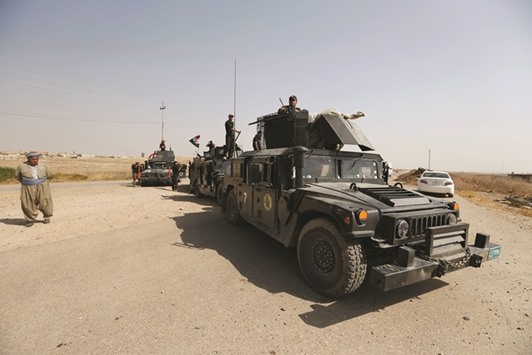Militant leaders are fleeing Mosul, a top US general in the coalition battling the Islamic State group said yesterday as Iraqi forces closed in on the northern city.
Mosul was where IS supremo Abu Bakr al-Baghdadi declared his “caliphate” two years ago but is now the group’s last major stronghold in Iraq.
Iraqi Prime Minister Haider al-Abadi, who announced the launch of a broad offensive to retake the city on Monday, visited the front line yesterday.
In the biggest Iraqi military operation in years, forces have retaken dozens of villages, mostly south and east of Mosul, and are planning multiple assaults for today.
“We are telling Daesh (IS) that their leaders are abandoning them. We’ve seen a movement out of Mosul,” said Major General Gary Volesky, who heads the anti-IS coalition’s land component.
He told reporters in a video briefing that the many foreigners among the 3,000 to 4,500 IS fighters would likely end up forming the core of the holdout militant force.
Volesky noted that the Iraqis would screen anyone leaving Mosul, and attempts by foreign fighters to blend in to an expected exodus of displaced people would be thwarted.
“It’s difficult for them to blend into the local population based on the number of different types of foreign fighters that there are,” he said.
Hundreds of thousands of civilians were still trapped in the city with dwindling supplies, many sheltering in basements as air strikes intensified on IS targets.
“We couldn’t sleep last night because of the air strikes. The explosions were huge,” said Abu Saif, a 47-year-old resident contacted by AFP.
“Many families are starting to run out of some basic food goods, there is no commercial activity in Mosul – the city is cut off from the world,” he said.
East of Mosul, forces were poised for an assault on Qaraqosh, which lies about 15km (10 miles) away and was once Iraq’s largest Christian town.
News of the move to recapture Qaraqosh sparked jubilation among Christians who had fled the town, with many dancing and singing in the Iraqi Kurdish city of Arbil on Tuesday night.
Units from Iraq’s elite counter-terrorism service, which has done the heavy lifting in most recent operations against IS, were poised to flush militants out of the town, officers said.
“We are surrounding Hamdaniya now,” Lieutenant General Riyadh Tawfiq, commander of Iraq’s ground forces, said at the main staging base of Qayyarah, referring to the district that includes Qaraqosh.
“There are some pockets (of resistance), some clashes, they send car bombs -- but it will not help them,” he said.
Qaraqosh was the largest of many Christian towns and villages seized by the militants who swept across the Nineveh plain east of Mosul in August 2014.
Kurdish peshmerga forces prepared to attack IS positions on several fronts north of Mosul while federal forces worked their way up the Tigris Valley.
The “caliphate” Baghdadi proclaimed in Mosul’s Great Mosque in June 2014 once covered more than a third of Iraq and parts of Syria.
But it has been shrinking steadily for more than a year and retaking Mosul would be a major setback for IS, all but ending its experiment in statehood.
Tens of thousands of personnel are involved in the operation to retake Mosul, far outnumbering IS fighters.
World leaders and military commanders warned that -- despite signs that early progress in the Mosul offensive was faster than predicted -- the battle could be long and difficult.
“Mosul will be a difficult fight. There will be advances and there will be setbacks,” Obama said on Tuesday.
After clearing towns and villages on the outskirts of Mosul with air support from the US-led coalition, Iraqi forces are expected to besiege the city before entering it.
Iraqi forces may allow fleeing IS fighters an exit to the west in a bid to minimise human and material losses.

Members of the Iraqi Special Operations Forces (ISOF) gather on the outskirts of Bartila during an operation to attack Islamic State militants in Mosul yesterday.
